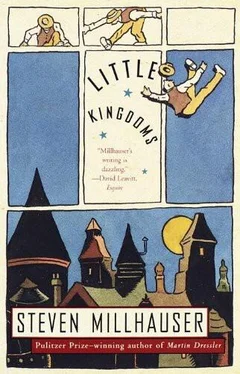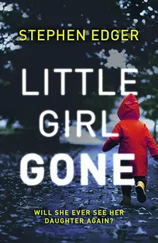One afternoon in July, as Franklin stepped out into the reception room of the Daily Crier on his way to lunch, he saw a handsome young woman in a straw hat with a bunch of fresh cherries on the brim. Her straight nose, her broad shoulders, the squiggle of pale hair falling along one temple, above all the faint shine on the skin beneath both eyes, all this struck him as vaguely familiar, and with an apology for intruding he asked her whether they had met. Slowly she raised her head and said, with nostrils tight-drawn: “I was under the impression that this was a newspaper office, not a dance hall,” and lowered her face decisively. Later he learned from a reporter in the newsroom that the haughty young woman was Cora Vaughn, daughter of Judge James Rowland Vaughn of the City Court; she was a schoolteacher who occasionally stopped by to look through the files in connection with school projects. Franklin, who had never heard of Cora Vaughn, was certain he had seen her somewhere: the quivering nostrils, the slight flush, the cherries trembling on the hat brim, all this made a deep impression on him, and when, the following summer, he sat all night by his father’s sickbed in the house in Plains Farms, remembering the tire swing and the grave voice in the darkroom, he suddenly thought of those quivering nostrils, those cherries trembling on the hat-brim. The crisis passed, though the mild apoplectic seizure seemed to have aged his father ten years. Two weeks later Franklin sat in his office, gazing out the window at reflections of passersby in the window of a restaurant and wondering if he could capture the effect in the next installment of his Sunday strip, when he saw Cora Vaughn step into the street. A moment later he saw that it was a different woman — he had been misled by the straw hat — but he remembered where he had first seen the real Cora: he had sketched her portrait in Klein’s Wonder Palace.
His courtship of Cora Vaughn was the most difficult thing he had ever set out to do. At first she refused to speak to him when he presented himself at the elementary school after the last bell had rung, and when he began sending her cartoons drawn especially for her, she promptly returned them. In the long winter nights, in the boarding house two blocks from his office, he brooded over Cora Vaughn until she seemed as familiar as his own childhood and at the same time mysterious and ungraspable. One Sunday afternoon when he was walking in Eden Park he saw her skating on the pond; she wore a blue wool coat and a white scarf, plumes of breath streamed out behind her, he felt strangely drowsy and heavy headed yet sharply alert. He turned away and stood looking down at the Ohio River, bordered by greenish ice. He thought of the war in Europe and wondered if the Marne ever iced over in winter. Men his own age were dying in battle every day. When he turned back she was no longer there, and he wondered if he had imagined it all: the white scarf, the plumes of bluish breath, the dark blades of the skates lifting and falling, the distant war. Slowly the ice in the river melted, the magnolias put out their waxy flowers, and one day as he was rounding the corner of Walnut and Sixth he looked up into the smiling face of Cora Vaughn. And all at once, just like that, he was sitting on her warm front porch with the tall pillars, inhaling a heavy odor of lilacs and speaking of the house in Plains Farms and his father’s voice in the darkroom. Evening after evening he sat on Judge Vaughn’s porch, watching the fireflies come out in the lavender dark and listening to the creak of the porch glider, and one August night in a riot of crickets that reminded him of the meadow behind his house in Plains Farms he proposed to Cora. She looked at him in troubled surprise, as if he had failed to understand something, and refused him brusquely. Suddenly she burst into tears and fled into the parlor.
After three sleepless nights Franklin returned to her street but dared not approach the porch. In the office the next day he found a brief, impatient note from Cora, asking where he had been. That evening she said that although she enjoyed his friendship, she could never marry a man who drew comic strips — the whole idea was unthinkable and impossible. Franklin opened his mouth to defend his trade, suddenly saw himself through her eyes, a ridiculous childish man who made silly pictures, and sank into silence. Cora Vaughn played Schubert sonatas on the piano and liked to talk about the contrasting methods of Delacroix and Ingres — how could she marry someone who thrilled to the life of a seedy dime museum and spent ten hours a day drawing for the funny papers? He thoroughly understood her distaste for what he did, and at the same time he obscurely felt that she herself didn’t understand something. She didn’t understand that his funny drawings were his path to a necessary place — a place that could never be expressed in words or pictures but that somehow was the vital center of things. He felt a confused pity for Cora Vaughn, and was shocked at his pity. He rose, tried to say something, and left in silence. That night he vowed to forget her and live in solitude; the next day he found an irritable note from Cora in his office, and eight months later they left on their honeymoon for New Orleans.
In Cincinnati Cora found a large house with bay windows and bracketed eaves, four blocks from Judge Vaughn’s mansion. Franklin would have liked to live farther from Cora’s old neighborhood, for she liked to spend the evenings at her father’s house; the judge was a grave but amicable man who seemed slightly puzzled by the presence of his son-in-law in the parlor and sometimes gave the impression that he had forgotten his daughter was a married woman. Franklin loved to watch Cora play the piano: she sat very straight, half closed her eyes, and allowed her head to sway and bow slightly; the mixture of stern control and dreamy abandon filled him with tenderness and longing. Sometimes he felt that he longed for her too much, that he was crude and disgusting in his desire; for he never knew whether Cora would welcome him or turn her face away and complain of tiredness. She had insisted on having her own bedroom, and although Franklin had agreed without protest, the arrangement left him feeling a perpetual guest. Once, in the first weeks of their marriage, Cora had come to him late at night. The sight of her standing by the bed in her pink silk nightgown trimmed with lace and small ribbons, her hair unbound, her eyes looking down at him with a kind of solemn tenderness, filled him with such pride and happiness that he suddenly became afraid, as if he had been given something he did not deserve and would not be allowed to keep.
Their daughter, Stella, was born the following spring. Franklin liked to warm her feet by pulling her tiny socks on, placing his mouth on the sole of a sock, and blowing until his lips felt hot. Sometimes at night he woke up, fearful that she had died in her sleep. Then he would creep into her room and bend down to hear her breathing, and after that he would stare at her a long time before pulling the blanket up to her chin and returning to his room.
He thought about blowing on her feet as he stood one night leaning against the wall of a barracks building in Waco, Texas, and stared up at the blue-black sky. He was dressed in olive drab. The sky reminded him of long boyhood summer evenings — the kind of evening he might never spend with his daughter. The armistice was signed three weeks later, and he was home for Thanksgiving, but for a long time he couldn’t get over the feeling that he was somehow responsible for neglecting precious weeks of his daughter’s life and that he must now be more attentive to her than ever.
That winter his father died, of a lingering cold that developed into influenza. He had never been the same since his stroke before the war, and Franklin, staring at the gaunt and white-haired man lying in bed with closed eyes, was carried violently back to the other father, the one who had raised and lowered his hand in the darkroom as he gravely counted out the numbers. It was as if this elderly stranger had usurped his father’s place and now, in death, was permitting the real father to return. After the funeral Franklin tried to find something of his father’s to bring back with him — an ivory-handled penknife, a photograph of the sweet-gum tree — but it all seemed flat and dead, and he returned to Cincinnati empty-handed, but with the real father alive inside him.
Читать дальше












